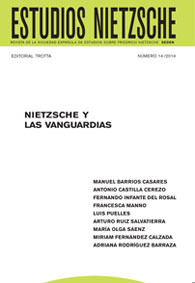Embracing the Horse. Aspects of the Relationship Between Nietzsche, Nihilism and Avant-garde
DOI:
https://doi.org/10.24310/EstudiosNIETen.vi14.10743Keywords:
Nietzsche, nihilism, dadaism, avant-gardeAbstract
Nietzsche was so attractive to the Avant-gardes, because they shared his desire for a radical alternative to the old world views and their exclusive categories. This paper argues that Dadaism was the artistic movement with a better understanding of Nietzsche’s concept of nihilism.
Downloads
Metrics
References
S. Aschheim, The Nietzsche Legacy in Germany, 1890-1990, Berkeley: University of California Press, 1992.
H. Ball, La huida del tiempo, Barcelona: Acantilado, 2005
H. Ball, Der Künstler und die Zeitkrankheit. Ausgewählte Schriften, Frankfurt a.M.: Suhrkamp, 1984,
G. Benn, «Nietzsche: Nach fünfzig Jahren», en Gesammelte Werke, vol. 1, Stuttgart: KlettCotta, 1962.
C. A. Bernoulli, Franz Overbeck und Friedrich Nietzsche, eine Freundschaft, Jena: Diederichs, 1908, 2 vols.
P. Bourget, Essais de psychologie contemporaine, Paris: Lemerre, 1883.
G. Campioni, Nietzsche y el espíritu latino, trad. y prólogo de S, Sánchez, Buenos Aires: El cuenco de plata, 2004.
E. Forth, Zarathustra in Paris. The Nietzsche Vogue in France, 1891-1918, Northern Illinois University Press: DeKalb, 2001.
Georg Grosz, en Íd. y W. Herzfelde, Die Kunst ist in Gefahr, Berlín: Malik, 1925.
W. Hertzfelde, «Die Ethik des Geisteskranken»: Die Aktion 4 (1914).
G.. Heym, Dichtungen und Schriften, vol. 3, ed. de K. L. Schneider, Hamburg: Heinrich Ellermann, 1960.
G. Heym, Der Irre, en Der Dieb: ein Novellenbuch, Leipzig, Rowohlt, 1913.
R. Huelsenbeck, «Einleitung», en Dada Almanach, Berlin: Erich Reiss, 1920.
C. P. Janz, F. Nietzsche. Biografía. 4. Los años de hundimiento, Madrid: Alianza, 1985.
W. Kandinsky, Über das Geistige in der Kunst, München: Pieper, 1912.
W. Kaufmann, Nietzsche – Philosopher – Psychologist–Antichrist, Princeton, 1974.
R. Krummel, Nietzsche und der deutsche Geist, Berlin: de Gruyter, 1974.
H. Mann, «Zum Verständnis Nietzsche», en Das Zwanzigste Jahrhundert – Blätter für Deutsche Art und Wohlfahrt 6/2 (1896), pp. 246-251; G. Fuchs, «Friedrich Nietzsche und die bildende Kunst», en Die Kunst für Alle XI/3, 5 & 6.
P. J. Moebius, Ueber das Pathologische bei Nietzsche, Wiesbaden: Bergmann, 1902.
F. Nietzsche, Obras Completas, I-IV (OC ). Director ed. Diego Sánchez Meca. Madrid: Tecnos, 2011-2016.
S. Taylor, Left-wing Nietzscheans: The Politics of German Expressionism, 1910-1920, Berlin: Walter de Gruyter, 1990.
T. Tzara, Le surréalisme et l’après-guerre, París: Nagel, 1948
H. Tuerck, Friedrich Nietzsche und seine philosophischen Irrwege, Dresden: Glöss, 1891.
Downloads
Published
How to Cite
Issue
Section
License
As of issue 21 (2021) this journal is published only in open access (diamond route).
From that number 21, like the previous numbers published in NIETZSCHE STUDIES, they are subject to the Creative Commons Acknowledgment-NoComercia-ShareIgual 4.0 license, the full text of which can be consulted at <http://creativecommons.org/licenses/by-nc-sa/4.0 >
It is the responsibility of the authors to obtain the necessary permissions of the images that are subject to copyright.
This work is licensed under a Creative Commons Attribution-NonCommercial-ShareAlike 4.0 International License.
Copyright generates two different rights: moral rights and patrimonial rights that EJFB recognizes and respects. Moral rights are those relating to the recognition of the authorship. They are rights of a personal nature that are perpetual, inalienable, unseizable and imprescriptible as consequence of the indivisible union of the author and his/her work.
Patrimonial rights are those that can be derived from the reproduction, distribution, adaptation or communication of the work, among others.







11.png)
